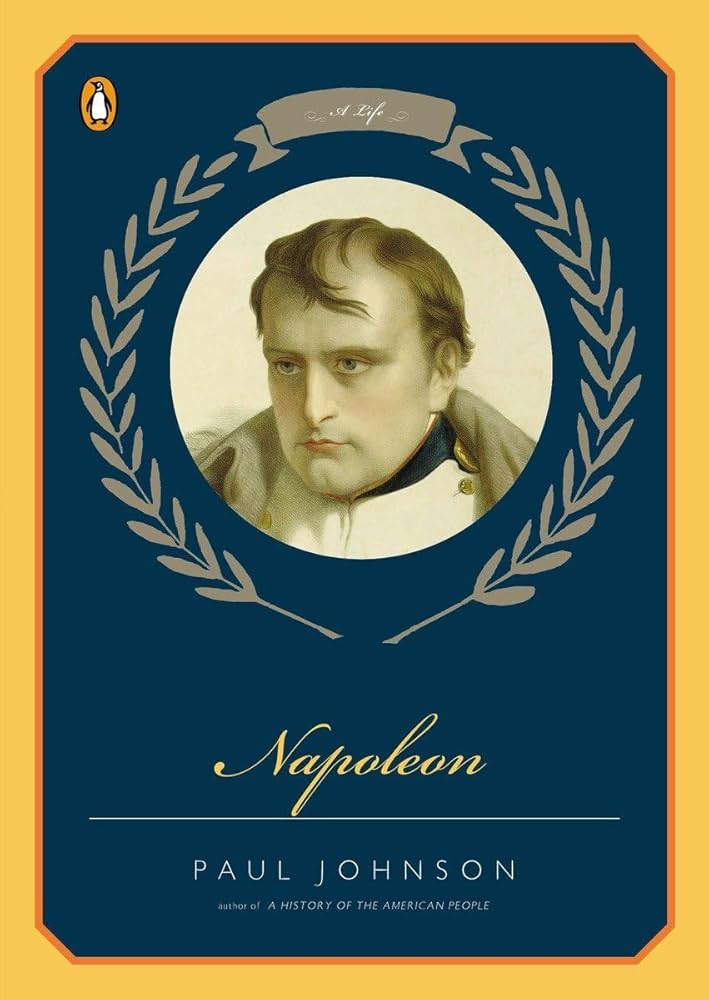He is the grandest possible refutation of those determinists who hold that events are governed by forces, classes, economics, and geography rather than by the powerful wills of men and women.
Page Introduction VII

Written by Paul Johnson
Total notes 11
He is the grandest possible refutation of those determinists who hold that events are governed by forces, classes, economics, and geography rather than by the powerful wills of men and women.
It does not seem to have occurred to him to study the example of his older contemporary George Washington, who translated military victory into civil progress and renounced the rule of force in favour of the rule of law. But Bonaparte always put his trust in bayonets and cannon. In the end, force was the only language he understood, and in the end it pronounced a hostile judgement on him.
… and the eventual revulsion against Bonaparte played a critical part in creating a spirit of German nationalism that was to become aggressive and threatening itself. A new concept of total warfare was born, and alongside it grew other institutions: the secret police, large-scale professional espionage, government propaganda machines, and the faking of supposedly democratic movements, elections, and plebiscites.
Notes -
Power by force, only feeds more violence through the generations.
The First World War itself was total warfare of the type Bonaparte's methods adumbrated, and in the political anarchy that emerged from it, a new brand of ideological dictator took Bonaparte's methods of government as a model, first in Russia, then in Italy, and finally in Germany, with many smaller countries following suit. The totalitarian state of the twentieth century was the ultimate progeny of the Napoleonic reality and myth
Notes -
Violence’s repercussions through generations.
To people of Bonaparte's background, the future lay not inland but outward - on the high seas and the great landmasses beyond.
Notes -
Opportunities can only be found in the landmasses beyond.
Beyond reading Boswell's book and deriving from it lessons that had nothing to do with the island, he took no interest in the place once he had left it. He never visited it. It never figured in his geopolitical calculations. On the other hand, he gave no sign that he was ashamed of his origins. He simply dismissed it from the forefront of his mind as carrying no importance in the economy of his ambition.
Though it is clear Bonaparte had bitter memories of his native isle, and wished to erase it from his mind, it did provide him with something important: a map of the kind of power he sought.
Indeed, if there was one characteristic that epitomized Bonaparte throughout his rise and grandeur, it was opportunism. He was the opportunist incarnate. Few successful men have ever carried a lighter burden of ideology. He had no patriotism as such, for he had no country. Corsica had been barred to him. France was no more than a career structure and a source of power. He had no class feelings, for though legally an aristocrat, he had no land or money or title, and saw the existing system of privilege as a fraud and, more important, as a source of grotesque inefficiency. But he had no hatred for kings or nobles as such. Nor did he believe in democracy or rule by votes. The people he observed with detachment: properly led, they could do remarkable things. Without sensible leadership, they were a dangerous rabble.
But on the whole it was the most successful aspect of Bonaparte's dictatorship, and one that served him well posthumously. For if Bonaparte had been merely a victorious soldier and conqueror, it would have been impossible in a country like France to have staged the public rehabilitation of the Napoleonic image that began in 1830 and continues to this day. Thanks to Denon, Bonaparte was able to play the cultural card with some success, and it still takes tricks.
Notes -
Investing in cultural growth pays enormous dividends in the long run.
What made Bonaparte such a dangerous opponent was his ability to seize upon a gap in his enemy's defences with extraordinary alertness, and respond to it with an aggressive move at high speed.
… he would have been infinitely wiser to have fought a defensive campaign, which would have raised great, possibly insuperable, problems for the Allies. 'But then he was always too impatient for that.'
Notes -
Patience is key.